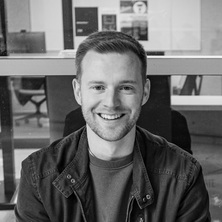Have you ever wondered what it's like to be the person behind the social media scenes? The person moderating social media content? Have you ever thought about the effects – the emotional toll – that this type of work might have on an individual?
These are the types of questions that Dr Andrew Dougall, a Postdoctoral Research Fellow in Digital Cultures and Societies (DCS) at The University of Queensland (UQ), aims to answer in his latest research, which looks at digital media institutions and platforms like Facebook and Twitter and explores how they play a role in ordering the world internationally.
Dr Dougall said there's a lot of literature on international relations that focus on the political work that emotions do – how we feel about things, who gets to feel and why.
"One of the things that I'm interested in exploring is thinking about how platforms and social media companies play a particular kind of role in the kind of hidden labour force that keeps many of these platforms running,” he said.
"We think about content moderation processes where you've got a group who are employed to review a lot of material to remove harmful and abusive content from it.
“The people doing that work have to soak up a lot of hugely traumatic stuff, but in doing that, they're ultimately preventing the end user from having to experience that.
“So, you've got this new way in which social media platforms are bringing about this distribution of emotion in world politics where the privileged user is benefiting in a way from not having to feel all these awful things that are falling on someone else who's behind the scenes.”
While it's easy being the privileged consumer sitting on the social sidelines, protected from experiencing the often harmful and abusive content seen, in particular, on political posts, Dr Dougall said it's important to remember that social media and other digital technologies are much more unsettling and complex than that in the way they work.
"By drawing that out, we can reveal, in a sense, a much more unsettling or complicated story of how these technologies work.
“They're not as seamless as they appear to be – not as benign as they seem to be," he said.
Describing his latest research as part of DCS, Dr Dougall said his work is interdisciplinary, translational, and international.
"One of the things that is interesting and cool about DCS is it includes people from across the Faculty of Humanities, Arts and Social Sciences here at UQ.”
Dr Dougall’s background isn't directly in media and communications research – he comes from a background of research on politics and international relations.
“Much of my work has been around trying to figure out how to sit in that space between disciplines – politics and international relations and media and communications studies,” he said.
"One of the things I've tried to do in moving between disciplines and translating back into international relations is both trying to capture this perfect balance where you're bringing in something that's valuable to your international relations audience, and you're trying to describe it and make sense of it in a way that makes sense to them.”
Expanding on this, Dr Dougall said that linked to the interdisciplinary aspect of his work, he's also involved in translation between these two disciplines – politics and international relations and media and communications.
"Many of the questions that interest me are political questions about how politics operate on a global scale. But because media is everywhere, because it's so ubiquitous – so much of our social life and political behaviour unfolds through digital media – I'm trying to think about the big political questions through that lens,” he said.
"That involves reading a lot of media and communications scholarships and trying to figure out how to translate that back into a frame that makes sense for international relations scholars."
Speaking about his background and how he came to choose a research career path, Dr Dougall said “a lot of really wonderful mentors were instrumental” in this decision.
“I was fortunate to work with people who gave me a lot of time and interest and tried to nurture my curiosity – the questions that I found interesting – and were encouraging in building connections with other universities.
Elaborating on his PhD, which he commenced in 2017 and completed in 2021, Dr Dougall said that as his research evolved, he became concerned with taking a more serious look at media and communications in politics and international relations.
“The year before I started my PhD we had the election of Donald Trump as US President. In the world of international relations, that was like an earth-shattering moment because you see the most powerful prestigious position in world politics suddenly occupied by someone who'd come from so far outside the political mainstream," Dr Dougall said.
"It seemed to a lot of us watching it that the internet played a particular role in this story, both because he had become famous as an individual for his tweeting and his outrageous online presence but also, more deeply, everything that we were beginning to think and trying to figure out about the role of social media in transforming our social and political lives, he seemed to be symptomatic of this."
Dr Dougall said these events led him to consider further the relationship between social media, breakthrough figures like Donald Trump and the challenge he presents to international order and to consider the issues comparatively.
“So, in what is now my book project – which was my PhD – I came across a separate case from almost 100 years earlier [in 19th Century Britain] that had a lot of similar things going on, but in the absence of internet technologies.
“Something I noticed was that it was closely linked to other communications revolutions that were happening at that time. So, the internet wasn't social media, but it was telegraphy and the kind of revolution in the printing press,” he said.
What he started doing was putting these cases side-by-side to figure out the relationship between the communication technology, these kinds of radical ideas and world order in both settings –how can we explain them, and then what can we learn from comparing them.
“The work on comparing Great Britain with Donald Trump, for example, is to say that actually, when 2016 happened there was a sense that social media was providing for the time this ability to mount these large-scale challenges on world order, but that's not entirely true – we've got prior examples.
“But the thing that separates these two cases is that the actors who were struggling to make this Great Britain a real thing 100 years ago, they weren't ultimately that successful.
“Part of the argument is that there have been certain things about the shifts to a digital media landscape that means it's possible and maybe even more likely that some of these disruptive movements can succeed, but it's not necessary that they do,” he said.
"It's not just about the technological change and saying that social media has arrived, and this is the thing that caused the breakthrough. It's about the social practices and the way we use these technologies that is really important, and that has changed.”

Postdoctoral Research Fellow
UQ's Digital Cultures and Societies
